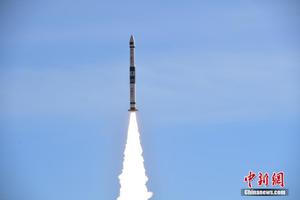 Xingyun-2 01 & 02 are launched by a Kuaizhou-1A (KZ-1A) carrier rocket at 9:16 am from the Jiuquan Satellite Launch Center in China, on May 12, 2020. (WANG JIANGBO / CHINANEWS.COM)
Xingyun-2 01 & 02 are launched by a Kuaizhou-1A (KZ-1A) carrier rocket at 9:16 am from the Jiuquan Satellite Launch Center in China, on May 12, 2020. (WANG JIANGBO / CHINANEWS.COM)
JIUQUAN - China on Tuesday sent two satellites into orbit to test the space-based Internet of Things (IoT) communications technology.
The satellites will conduct tests on technologies including space-based IoT communications, inter-satellite laser communications and a low-cost commercial satellite platform
The satellites, Xingyun-2 01 and 02, were launched by a Kuaizhou-1A (KZ-1A) carrier rocket at 9:16 a.m. (Beijing Time) from the Jiuquan Satellite Launch Center in northwest China. They have successfully entered their planned orbit.
READ MORE: Favorable policies and fierce competition driving IoT industry
Developed by the Xingyun Satellite Co., the satellites will conduct tests on technologies including space-based IoT communications, inter-satellite laser communications and a low-cost commercial satellite platform.
They will also carry out initial pilot IoT applications, according to the company.
KZ-1A is a low-cost solid-fuel carrier rocket featuring high orbit precision and a short preparation period. The rocket, developed by a company affiliated with Sanjiang Group under the China Aerospace Science and Industry Corporation (CASIC), is mainly used to launch low-orbit small satellites.
ALSO READ: Wuxi turns to IoT industry for growth
Tuesday's launch was the ninth mission of the KZ-1A carrier rocket.


